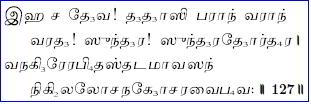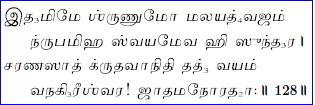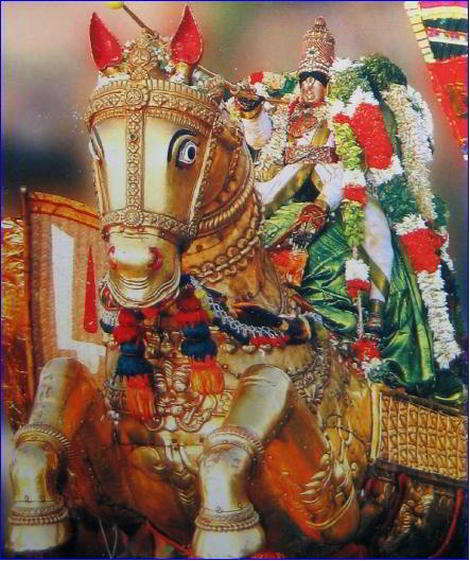
- SlOkam 127:
- SlOkam 128:
- SlOkam 129:
iha ca deva! dadAsi varAn parAn
varada! sundara! Sundaradordhara! |
vanagire: abhita: taTam Avasan
akhila locana gocara vaibhava: ||
In the previous Slokam, KUresar referred to Azhagar becoming Varadar of Kaanci to bless Harita VaarANa Bhrtyar with eye sight. In this Slokam, KUresar visualizes Varadan of Kaanci transforming to Azhagar to grant the desired boons to His bhaktAs.
Those who reach His drshTi padam are the fortunate ones to receive all the boons that they desire.
Meaning:
Varada ! Sundarordhara (SundarabAho)! deva! You have chosen as Your place of residence the foothills on the four sides of TirumalirumcOlai hills (vana gire abhita: iha ca taTam Avasan) and have become clearly visible to the eyes of all of Your bhaktAs (akhila locana gocara vaibhava:) and grant here superior boons to them (parAn varAn dadAsi).
idam ime SrNumo malayadhvajam
nrpam iha svaymeva hi sundara |
caraNasAt krtavAn iti tat vayam
vanagirISvara! jAtamanorathA: ||
In this Slokam, KUresar refers to the special anugrahams that a PaaNDya King, Malayadhvajan, received from Azhagar and wishes that we would also be beneficiaries of such anugraham.
Meaning:
Oh Vanagriri ISvarA! SundarA! We heard that You made King Malayadhvaja PaaNDyan a servant at Your sacred feet on Your own (malayadhvajam nrpam svayameva caraNasAt krtavAn). He was indeed very fortunate to receive such anugraham. Inspired by this happening, we have also become Your antaranga KaimkaryaparALs and hope to be blessed like the King Malayadhvajan.
Comments:
Malayadhvaja PaaNDyan was a PaaNDya King of the times of PeriyAzhvAr. At His court, PeriyAzhvAr at the request of His AcAryan Selva nambi (the Minister of the King) established the Paratvam of Sriman nArAyaNan and the darSana saubhAgyam of Sriman nArAyaNan and His devis. TiruppallANDu was born at that time. The PaaNDyan king was a great VishNu bhaktan. Once he wanted to go on a tIrthA yAtrai to northern divya desams. His chariot stopped at TirumAlirumcOlai and would not move further. He asked the locals about the special reasons and learnt that TirumAlirumcOlai was the seat of the great Azhagar and nUpura Gangai. He took bath every day in nUpura Gangai and worshipped the Lord. He also built the kOil, MaNTapam, gosAlai and ramparts. Azhagar was very pleased and made the king very dear to Him and blessed Him with Moksham at the end of his life.
vij~nApanAm vanagirISvara! satyarUpAm
angIkurushva karuNArNava! mAmakInAm |
SrIrangadhAmani yathapuram ekata: aham
rAmAnujArya vaSaga: parivartishIya ||
KUresar seeks from Azhagar the boon of being reunited with AcArya RaamAnuja at Srirangam. His Acaryan was at TirunArAyaNapuram and KUresar, who had lost his eyes due to the cruelty of the fanatic cozha king did not desire to live at Srirangam without His AcAryan. Hence this prayer for reunion at Srirangam with His AcAryan.
Meaning:
Oh Ocean of Mercy (karuNArNava) ! VanagirISvara! Please accept aDiyEn’s sincere request (mAmakInAm satyarUpAm vij~nApanam angIkurushva). May aDiyEn be reunited with my AcAryan as before at Srirangam and serve Him always! (SrIrangadhAmani yathApuram ekata: aham rAmAnujArya vaSaga: parivartishIya).
Comments:
With the 128 Slokams so far, KUresar eulogized Azhagar in the manner of Swamy ALavanthAr (yadvA SramAvadhi yathAmati vA api aSakta: staumi). At the beginning of SrI SundararAja stavam, KUresar expressed his keen desire to see the sacred feet of Azhagar (tata iha sundarorubAhum stoshye tat caraNa vilokanAbhilAshI) and started the nirmANam of this beautiful stavam to overcome the grief of separation from His AcAryan. After saluting Azhagar through 128 Slokams, he remembers his original wish of being reunited with His AcAryan and seeks this boon from Azhagar. Through this Slokam, he reveals the importance of AcArya Kaimkaryam over Bhagavat and BhAgavata Kaimkaryams. KUresar did not create a stavam for SrI RanganAthan and left it to His precocious son, ParASara BhaTTar, who composed it while He was away from Srirangam on a self-imposed exile at TirukkoshTiyUr. As the SundarabAhu stavam comes to a close, KUresar refers to Srirangam (SrIiranga prastAvam) four times.
Source:
Oppiliappan KOil Sri Varadachari SaThakOpan Swami












